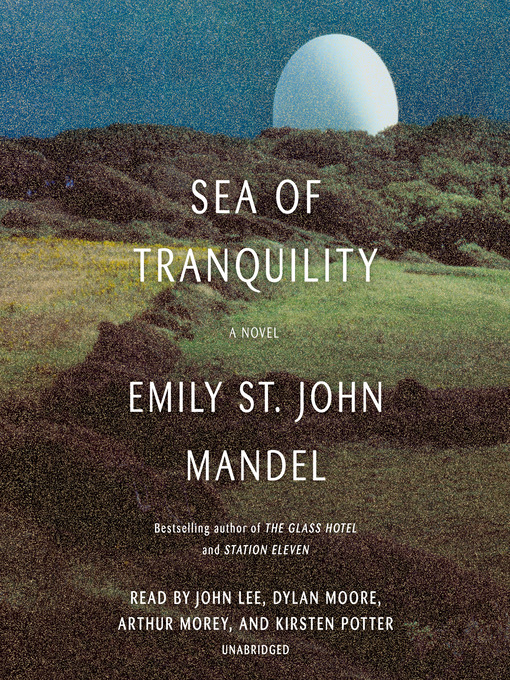
One of the Best Books of the Year: The New York Times, NPR, GoodReads
“One of [Mandel’s] finest novels and one of her most satisfying forays into the arena of speculative fiction yet.” —The New York Times
Edwin St. Andrew is eighteen years old when he crosses the Atlantic by steamship, exiled from polite society following an ill-conceived diatribe at a dinner party. He enters the forest, spellbound by the beauty of the Canadian wilderness, and suddenly hears the notes of a violin echoing in an airship terminal—an experience that shocks him to his core.
Two centuries later a famous writer named Olive Llewellyn is on a book tour. She’s traveling all over Earth, but her home is the second moon colony, a place of white stone, spired towers, and artificial beauty. Within the text of Olive’s best-selling pandemic novel lies a strange passage: a man plays his violin for change in the echoing corridor of an airship terminal as the trees of a forest rise around him.
When Gaspery-Jacques Roberts, a detective in the black-skied Night City, is hired to investigate an anomaly in the North American wilderness, he uncovers a series of lives upended: The exiled son of an earl driven to madness, a writer trapped far from home as a pandemic ravages Earth, and a childhood friend from the Night City who, like Gaspery himself, has glimpsed the chance to do something extraordinary that will disrupt the timeline of the universe.
A virtuoso performance that is as human and tender as it is intellectually playful, Sea of Tranquility is a novel of time travel and metaphysics that precisely captures the reality of our current moment.
-
Creators
-
Publisher
-
Release date
April 5, 2022 -
Formats
-
OverDrive Listen audiobook
- ISBN: 9780593552001
- File size: 166597 KB
- Duration: 05:47:04
-
-
Languages
- English
-
Reviews
-
AudioFile Magazine
The four narrators who deliver Mandel's newest novel create a mesmerizing listening experience full of time shifts. Kirsten Potter shines as an author on a book tour at the beginning of a 2200s pandemic; her increasingly worried observations hit close to home. Dylan Moore brings a perfect mix of malaise and inertia to her characterization of a young woman living in 2020 New York. John Lee effortlessly transports listeners from British Columbia in 1918 to the moon colonies of the twenty-fifth century. Arthur Morey's beautiful, throaty narration of the final section, about a man from the moon colonies whose life is changed forever by a mysterious government job, is haunting and familiar. These interlocking storylines offer a poignant and surprising exploration of love, art, and the beauty of everyday life. L.S. © AudioFile 2022, Portland, Maine -
Library Journal
June 1, 2022
In 1912, a young man hears violins in a remote Canadian forest; nearly a century later, a teenager has the same disorienting experience under the same tree. Hundreds of years after that, an author walking through an airship terminal suddenly sees trees growing up around her. A century after that, a young man named for a character in the author's pandemic novel investigates a strange temporal anomaly. The lives of these characters and others intersect in subtle and significant ways throughout this work, which is elevated by the performances of four talented readers. In a nod to the way this refers back to two of Mandel's previous novels, the cast includes two narrators who read those books. Kirsten Potter, who narrated Station Eleven, is especially well suited to Mandel's work. Her voice is by turns wry and tender, echoing the elegant way the novel balances moments of everyday beauty with complex philosophical questions and moments of humor. VERDICT Given the popularity of Mandel's work, the recent TV adaptation of Station Eleven, and the timeliness of the topic, expect high demand for this excellent audiobook.--Emily Calkins
Copyright 2022 Library Journal, LLC Used with permission.
-
Good Reading Magazine
The one rule that should never be broken for time travel is that you should just observe the past, never change it. It’s a rule that tests investigators from the Time Institute, situated in Colony Two on the moon. Gaspery Roberts, after a going-nowhere career as a security guard in a hotel, would like to be given a chance to test himself investigating the past. The golden rule in fiction is that protagonists are introduced front and centre in the narrative. In this page-turning novel, Gaspery is merely an incidental character in the first half of the book. This is far from a mistake, however, as Mandel eases the reader into an imagined world from the recognisable past to the present and through to the future. Three separate characters, from three separate time periods witness what feels like an hallucination to them: under a maple tree in a forest in British Columbia, a blackout, and violin music in a station of some sort. Edwin (exiled from England) knelt under the tree in 1912; Vincent filmed it by accident in 1994; Olive (bestselling author, with a character after whom Gaspery is named) walked through the terminal in 2203. Gaspery’s sister, Zoey, works as a scientist in the Time Institute. While Gaspery is keen to investigate this apparent glitch in time, Zoey fears for his future should things go wrong. Pandemics – sadly very topical – appear throughout. Mandel envisions each time period flawlessly, capturing and rounding every character and place into a believable whole. She even finds space for a metanarrative on post-apocalyptic fiction. Her plotting is exceptional, with the denouement offering a plausible and inevitable conclusion. Without doubt, Sea of Tranquility is the best speculative fiction this year. Reviewed by Bob Moore ABOUT THE AUTHOR St John is my middle name. The books go under M. Emily St John Mandel is the author of six novels, most recently Sea of Tranquility, which has been translated into 25 languages and was selected by President Barack Obama as one of his favourite books of 2022. Her previous novels include The Glass Hotel, which was also on Obama’s list, was shortlisted for the Scotiabank Giller Prize, and has been translated into 26 languages; and Station Eleven, which was a finalist for a National Book Award and the PEN/Faulkner Award, won the 2015 Arthur C. Clarke Award among other honours, has been translated into 36 languages, and aired as a limited series on HBO Max. She lives in New York City and Los Angeles. Visit Emily St John Mandel's website -
BookPage
Spanning centuries past and present, on Earth as well as the moon, Sea of Tranquility (6 hours) by Emily St. John Mandel is as vast as an ocean and as ambitious as the determination to cross it. One awe-inspiring moment in a forest setting links its characters, which include a 19th-century British gentleman who is banished by his family to British Columbia, a 20th-century victim of a Ponzi scheme, a 22nd-century writer whose books about pandemics make her all too aware of another on the horizon and a 23rd-century investigator from the Time Institute who risks changing history with his findings. Narrators John Lee, Dylan Moore, Arthur Moorey and Kirsten Potter bring out the eeriness of the novel's central coincidence. Their well-paced voices—sometimes aloof, sometimes deadpan—foreshadow crises like the calm before the storm. As the narrators' voices bleed into different sections, rather than remaining relegated to an individual character, the audiobook becomes something like a stage play in an interdimensional theater. With dignified eloquence, Mandel's literary sci-fi novel raises questions and offers hope about the future consequences of pandemics, colonization and technological advances. Read our starred review of the print edition of Sea of Tranquility. -
BookPage
The sixth novel from Emily St. John Mandel, author of the award-winning, bestselling Station Eleven, is a time-travel puzzle that connects a disparate band of characters. Sea of Tranquility opens in 1912, as Edwin St. John St. Andrew, the aimless youngest son of an English earl, makes his way across Canada. Edwin lands in Caiette, a remote settlement in British Columbia, where he experiences something that cannot be easily explained, and encounters a strange man named Roberts who claims to be a priest. The narrative then leaps to 2020 in New York City, where Mirella Kessler is trying to discern her friend Vincent’s whereabouts. (Readers of Mandel’s fifth novel, The Glass Hotel, will recognize Mirella and Vincent.) Mirella finds herself talking to a stranger, Gaspery Roberts, who seems familiar. Gaspery wants to know about a glitchy moment that Vincent captured on video years ago. The narrative skips ahead again, to the year 2203, when writer Olive Llewellyn is on a book tour, talking to audiences on Earth about her bestselling pandemic novel. Olive lives with her husband and daughter in Colony Two on the moon. Olive, like Mirella, finds herself talking to a man who calls himself Gaspery Roberts. Gaspery, a magazine reporter, asks about a brief scene in her novel, an odd moment in the Oklahoma City Airship Terminal. And then once more, the narrative jumps forward in time, and now Gaspery Roberts begins to tell his own story. How these four (and a few other) characters are linked, and how one strange moment reverberates through time, are the subjects of this novel. There’s a mournfulness to Sea of Tranquility. Its main characters feel themselves to be exiles, trying to sort out where and how they belong. But the novel is playful, too, taking a metafictional turn: Olive, like her creator, Mandel, has written a bestselling novel about a pandemic, and she’s stuck on an endless book tour, far from her family, as an actual pandemic approaches. And Gaspery is a dryly funny, self-deprecating guide to his era and his unlikely travels through time. Although readers may question the particulars of the novel’s depiction of the future (wouldn’t the concept of a book tour be impossibly quaint, or even unknown, by 2203?), Mandel’s character development will sweep them along. Turn-of-the-century character Edwin’s sections are particularly well rendered. Mandel’s prose is beautiful but unfussy; some chapters are compressed into a few poetic lines. The story moves quickly, the suspense building not only from the questions about that one strange moment but also from the actions of those investigating it. In the end, the novel’s interlocking plot resolves beautifully, making for a humane and moving time-travel story, as well as a meditation on loneliness and love. Read more: Through multiple audiobook narrators, Emily St. John Mandel's novel transforms into a stage play in an interdimensional theater.
-
Loading
Why is availability limited?
×Availability can change throughout the month based on the library's budget. You can still place a hold on the title, and your hold will be automatically filled as soon as the title is available again.
The Kindle Book format for this title is not supported on:
×Read-along ebook
×The OverDrive Read format of this ebook has professional narration that plays while you read in your browser. Learn more here.



